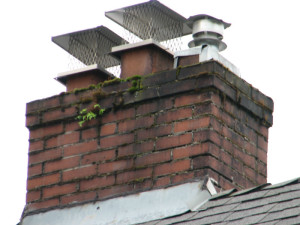Water in your fireplace and chimney – whether it is a few small drops or a large puddle – is never a good thing. And because chimneys have many different components, identifying the exact cause of a chimney leak can be difficult. However, it is important to identify – and repair – the underlying cause of the chimney leak in order to prevent further water damage from occurring.
 Common causes of chimney leaks
Common causes of chimney leaks
The following are four of the most common causes of chimney leaks. Because every chimney system – and leak – is unique, a professional chimney inspection is often needed to identify the exact cause of the leaky chimney.
- Chimney cap: Made of a solid metal top with mesh or wire sides, the chimney cap is designed to keep water, animals, and debris out of the flue. If the chimney cap is ill-fitting, incorrectly installed, or damaged in any way, water can begin to leak into the chimney.
- Chimney crown: While chimney caps protect the top of the flue, chimney crowns seal the top of the chimney. Made of masonry, stone, or concrete, chimney crowns often bear the brunt of the exposure to the elements; their flat top means they are especially prone to water damage from rain, ice, and snow. Because of this, chimney crowns can crack and allow water in, causing a chimney leak.
- Flashing: Flashing seals the joint between the roof and your chimney. Made by layering strips of metal to create a watertight seal, leaks caused by faulty flashing are often blamed on roofs instead. Whether it was installed with too many nail holes, was jostled while the roof was being repaired, or has simply been exposed to the elements for too long, leaky flashing can damage the roof, masonry, ceilings, and walls surrounding the chimney.
- Masonry: Your bricks and mortar themselves can let water in. Because masonry is naturally porous, small amounts of water and constantly being absorbed. However, the absorption of too much water can damage the masonry; this leads to masonry holes and cracks that can create leaks.
Preventing chimney leaks
Oftentimes the best way to prevent chimney leaks is through regular chimney maintenance. Annual chimney sweepings and inspections can insure that no parts of your chimney are damaged – and that there are no unseen areas of water entry.
In addition to annual inspections, waterproofing may be able to protect your masonry against water. During the waterproofing process, specially designed masonry water repellants are applied to the bricks and mortar. These products penetrate deeply into the masonry, keeping new water out but allowing old water to evaporate.
Don’t let a leaky chimney cause damage to your fireplace and chimney system. Instead, have a chimney professional diagnose – and repair – the cause of your chimney leak. Contact Pristine Sweeps today for more information on how we can repair your leaky chimney and the damage to your fireplace it may have caused.
